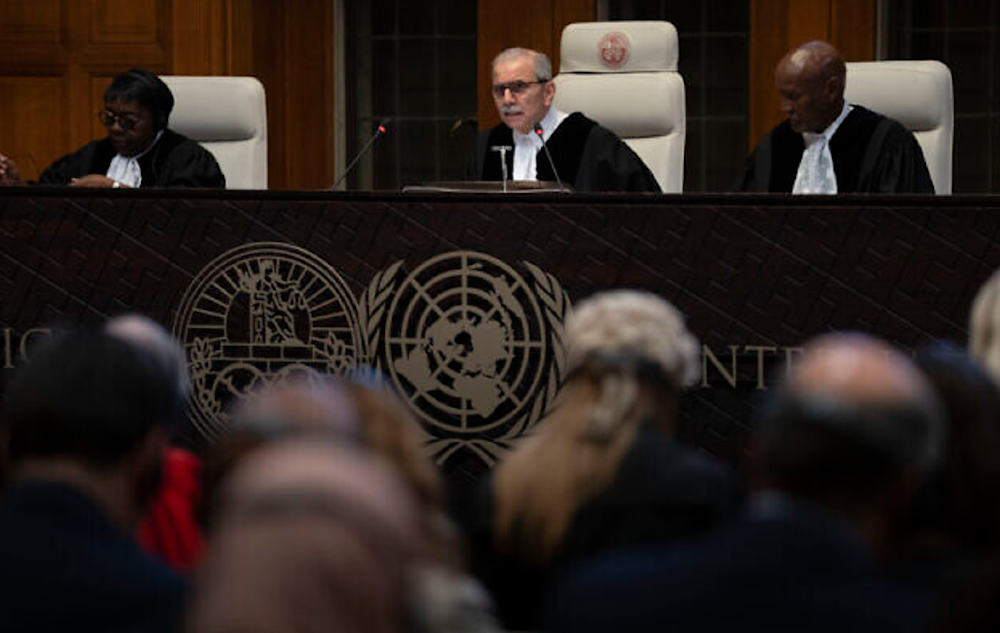South Africa to submit dossier of evidence of Gaza genocide to ICJ
The ICJ has ordered that some rights presented by South Africa in its genocide case against the Israeli war on Gaza are plausible.
-

Presiding Judge Nawaf Salam reads the ruling of the International Court of Justice in The Hague, The Netherlands, on May 24, 2024. (AP)
South Africa is to file a comprehensive memorial against "Israel" to the International Court of Justice (ICJ) on Monday, hoping to bolster its argument that the Israeli occupation is committing genocide in Palestine.
A South African embassy source anonymously revealed to Anadolu Agency that the memorial will be submitted on Monday.
South African Foreign Minister Ronald Lamola told the Daily Maverick news website that the memorial has further evidence, in "forensic detail', to establish that "this is not just a plausible case of genocide, but indeed genocide."
According to the report, once a memorial is submitted, "Israel" has until July 28 of the following year to file a counter-memorial.
In January, the United Nations' highest court asserted its jurisdiction to act on the emergency measures sought by South Africa in its lawsuit against "Israel's" actions in the war on Gaza.
Despite the Israeli request for dismissal, the World Court stated that it would not dismiss the case.
The ICJ ordered that some rights presented by South Africa in its genocide case against the Israeli war on Gaza are plausible.
Several nations have joined the action, including Turkey, Nicaragua, Palestine, Spain, Mexico, Libya, Bolivia, and Colombia.
As the reading proceeded, the court recognized the right of Palestinians in Gaza to be protected from acts of genocide, adding that the Palestinians are a protected group under the genocide convention. However, the ruling does not deal with the core accusation of the case - whether genocide occurred - but focuses on the urgent intervention sought by South Africa.
Among the measures South Africa requested was an immediate halt to the aggression, which has killed around 43,000 Palestinians.
Will legal challenges be the answer to end the war on Gaza?
Diala Shamas, an attorney with the Center for Constitutional Rights (CCR), has been working to leverage international and US law to halt the war on Gaza. She is part of a group of lawyers active in courthouses from California to The Hague, addressing the legal implications of the war on Gaza, which has killed around 43,000 Palestinians.
Significant developments have occurred in the International Court of Justice (ICJ), which identified a “plausible risk” of genocide in Gaza. Additionally, the International Criminal Court's chief prosecutor has recommended arrest warrants for the leaders of both the Palestinian Resistance and "Israel".
Meanwhile, legal actions regarding the supply of weapons to "Israel" are progressing in various countries.
"We've seen more action and more direct engagement with international law in this last year than I think I can remember," Shamas told The Guardian.
Shamas and her colleagues have sought accountability in American courts regarding what they see as Biden's complicity, though their efforts have largely been unsuccessful.
In November 2023, the Center for Constitutional Rights (CCR) filed a lawsuit against the Biden administration for contributing to genocide via the provision of weapons to "Israel".
The case was dismissed in January by a federal judge, who deemed it a “political question” beyond the court's jurisdiction, a decision upheld by an appeals court. Despite the unfavorable rulings, Palestinian plaintiffs provided poignant testimonies, some from Gaza, recounting the impacts of the Nakba. Shamas highlighted the significance of using the word "Nakba" in federal court, noting that it was crucial for Palestinians to be “taking the stand while they're not on the defense.”
Reed Brody, an experienced war crimes prosecutor, is confident about the effectiveness of the initiatives of the ICJ and ICC, citing that despite being a devastating year for Gaza, it has been a "historic turning point in the use of the law in efforts to hold the Israeli government and its leaders accountable."
Other countries, including Germany, the Netherlands, and the United Kingdom, have limited certain arms shipments to "Israel" during the last year. "Lawyers are going domestic and saying, 'You can't do this, because you are becoming complicit in genocide or crimes against humanity," Brody told The Guardian.
"I think we're going to see that everywhere," he maintained.

 4 Min Read
4 Min Read








